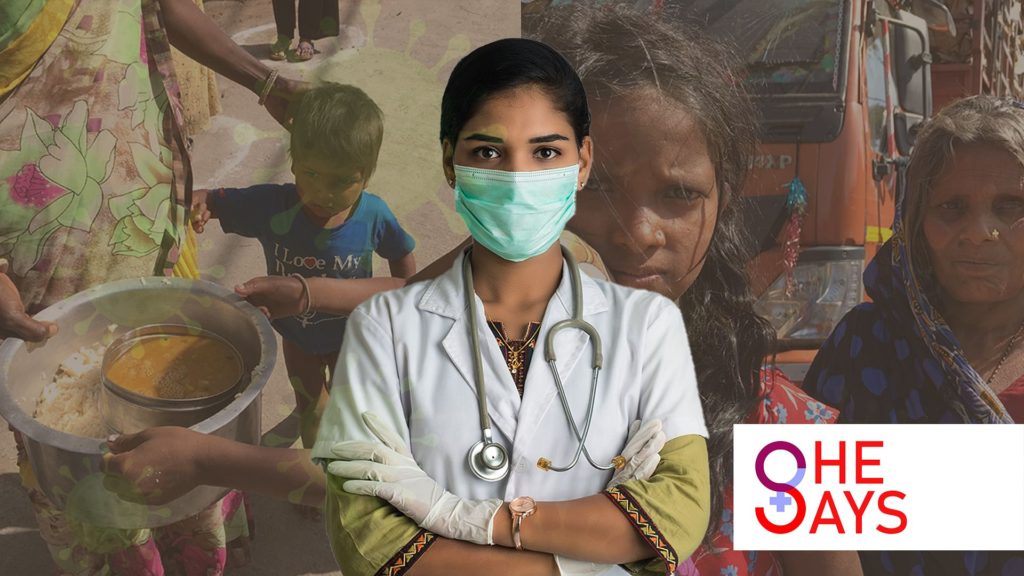Nishtha Satyam
Four months into the Covid-19 pandemic, the world has effectively, though unevenly, come to a standstill. Healthcare systems of several countries, including India’s, have been overwhelmed. Several erroneous beliefs about the self-regulatory capacity of world markets have also come undone. It’s ironic yet fitting that the human race’s proclamations of supremacy have been severely tested by a species that hardly any of us has seen even under a microscope.
As the battle against the virus continues, there is a lot to be said about the world as it existed only a few months ago. There are several lessons – social, economical, legal, cultural, and even existential – to be learnt here. The acclaimed novelist Arundhati Roy believes that the pandemic is a portal. It is an opportunity for people and governments to collectively re-evaluate the values and ideas they hold dear. To do this is to take a hard look at our past and to project ourselves into a future that overcomes shortcomings that previously lay unaddressed. Roy’s argument is compelling because it forces a reckoning on all fronts. Nothing is irrelevant, or “secondary”: world-ending events defy priorities, everything is important. Everything that got brushed aside, ignored, or ridiculed in the past need not anymore. A roadside graffiti in Hong Kong explains this the best: “we can’t go back to normal because normal was the problem in the first place.”
As the world re-problematises and social media champions dialogues on the pressing need to tune into nature, consume responsibly and act kindly, the obtuse social divide through the lens of income, access and gender is now beyond ignorable. Just as the largest democracy rushed to grocery stores to stockpile, the sick gathered their medicines, the poor walked back in sweltering heat to their homes, women who were at the centre of all this had a shadow pandemic following. Lightly walking beyond the fear and panic caused by the outbreak was the fear of home. The pandemic has challenged all we knew about the dynamics of economics and power, both inside the home and outside. While many of us have had the privilege of home, a safe space, many women have long dreaded the four walls of home, a private chamber that reminds them of the horror and terror of physical, emotional and psychological abuse. Across the world, the dread now lies exposed, along with the inescapability of it. The pandemic has upended several assumptions about contemporary world order and equality.
One of the most commonly reported issues since the global lockdown began has been that of gender violence. India is no exception. In this global curfew, millions of women have no option but to confine themselves with their abusers. With their physical safety threatened both indoors and outdoors, they find themselves helpless. Abusive behaviour and gaslighting women and children is a common trend in several households. With the abuser indefinitely locked inside the home, it is not a matter of if but how many such cases are occurring. Setting up helplines and advisories may not address the problem fully, especially when there are millions who don’t have stable electricity connections, let alone mobile phones to call a helpline and a safe space to do so. Even those who have the means of calling usually hesitate because of the power the abuser holds over the victim.
Let us dig into the data we have to better understand this. Since the lockdown was imposed, complaints received by the National Commission of Women related to various offences against women have increased from 116 to 257. Complaints about domestic violence, received mostly through email, increased from 30 to 69. Of the 257 cases, 77 are related to the right to live with dignity, 15 are of harassment of married women in their home, two of dowry deaths, 13 of rape or attempt to rape. There have also been media reports of violence against women and girls linked to Covid-19.
In deeply patriarchal societies like India, the lockdown has exaggerated two aspects of women’s lives – unpaid care work and domestic abuse. With the family staying home throughout the day, the burden on women of doing household chores has piled up.
Solving these problems is crucial to ensuring the safety of millions of women across the world. It is no longer a matter of choice whether women are recognised as key stakeholders in the Covid-19 pandemic and centrestaged in our response to it given that they are 70% of the global healthcare force and do almost 70% of agricultural work – the two sectors that are critical to business continuity. Still, the world appears to be missing the most marginalised section affected by the problem and also the most potent link in the solution – women.
Across the globe, women earn less, save less, hold less secure jobs, are more likely to be employed in the informal sector. They have less access to social protections and are the majority of single-parent households.
Putting women and girls at the centre of economies will fundamentally drive better and more sustainable development outcomes for all, support a more rapid recovery, and place us back on a footing to achieve the Sustainable Development Goals. In essence, women need to be recognised as the vanguard of the Covid-19 response.
Before we get into the solutions, what are our stark learnings from this?
One, women and girls remain on the margins and the slightest socioeconomic shock propels them into multi-dimensional poverty and discrimination.
Two, women as decision-makers are going to be key in having access to a diversity of opinions, perspectives and methods in dealing with complex socioeconomic challenges with deep and lasting social fallout. It is hard to pass by the fact that the six countries that have mounted the most noteworthy response to the pandemic are led by women. The fact that domestic abuse has emerged as a stated worry in many of the briefings held by women leaders is probably indicative of their ability to think broader – to think of the unintended impact of state action.
Now that we know that the most effective change agents are also the most marginalised, that they are underrepresented in the conception and execution of a response system, we know what needs to be done. As governments, central and state, execute a response to the pandemic and a recovery plan, they need to make women integral to their strategies, for their participation will be key in determining the effectiveness.
As a start, centrestaging women will enable effective use of existing informal mechanisms of sharing information and addressing problems that are central to equitable development. Self Help Groups of women have collectively provided meals twice a day to over seven lakh people through about 10,000 community kitchens across the country. Both the Bhilwara and Kerala models of containing the coronavirus outbreak that are being talked about in policy circles have women at their centre. The Bhilwara model relied heavily on Corona Fight Teams led by ASHA and Anganwaadi workers. While Kudumbashree, which is central to the Kerala model, is responsible for creating 1.9 lakh WhatsApp groups with 22 lakh NHG members to educate them about government instructions on Covid-19 and preparing grocery kits for 87 lakh families.
Both models illustrate the power of leveraging the informal networks that women have created over the years and the clustered approach to thinking and operating.
Allowing seamless communication is an important measure in empowering women worldwide. Many of the problems faced by women don’t come to light because of the lack of institutional support that enables them to speak up. By collecting and sharing information, the world can curate a better response to the pandemic, while also addressing the systemic fault lines that have become more than evident now. In this sense, the pandemic serves as a unique opportunity to address gender issues.
At its core, imagining the world anew is a creative step. It is not something that can be done incrementally or in phases. It is a rapid and immediate break from the old order to embrace a new beginning. The Covid-19 pandemic has caused havoc and, for that very reason, offers unprecedented potential for change. For entrenched gender issues, the time has never been more ripe to take decisive action – to step through the portal.
(Nishtha Satyam is deputy country representative for UN Women in India.)




